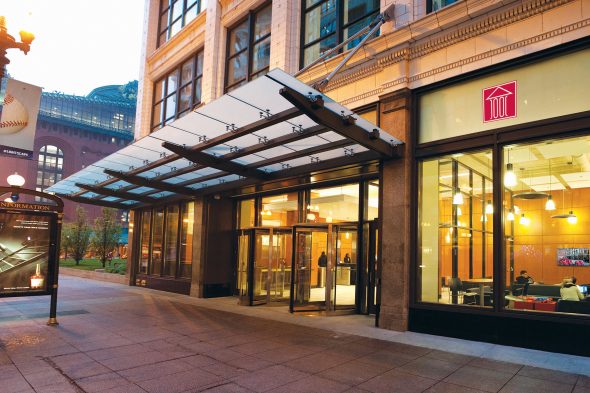New buildings, law school acquisition reflect UIC’s momentum as a driver of innovation, opportunity in Chicago
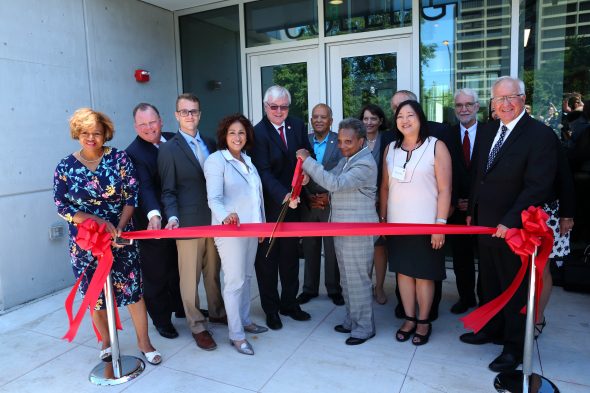
While UIC is expanding its campus footprint, it also is cementing its role as a critical partner in furthering Chicago’s efforts to remain competitive in the 21st-century global economy, Chicago Mayor Lori Lightfoot said during a visit to campus July 22.
“It’s important to say, in this moment, that UIC is one of the most important institutions in our city,” Lightfoot said during a ribbon-cutting celebration for the new Engineering Innovation Building.
“I am committed to making sure that we form better relationships with this important university to make sure that a lot of the important research that’s going on, a lot of the work that’s being developed here, gets the appropriate recognition and acknowledgement that it deserves, and that we use a lot of the work that’s being generated by your scholars here as part of our thinking about how to build a better, stronger and fairer Chicago.”
Three major projects on campus have come to fruition this summer to reflect UIC’s momentum as a driver of innovation and opportunity in Chicago: the openings of the UIC Engineering Innovation Building and Academic and Residential Complex and the UIC John Marshall Law School received approval from the Higher Learning Commission, the last step in the accreditation process.
UIC Engineering Innovation Building
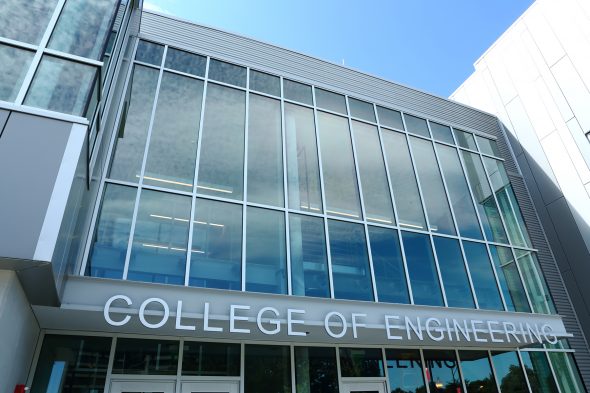
Photo: Jenny Fontaine 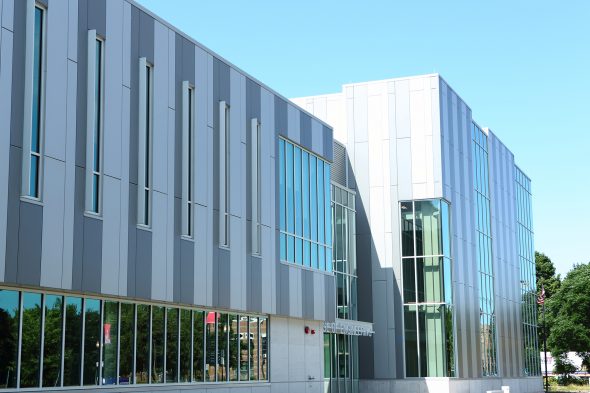
Photo: Jenny Fontaine 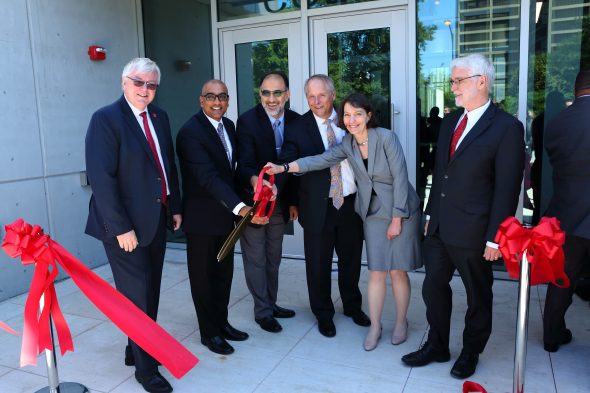
Photo: Jenny Fontaine
UIC’s newest academic building meets student demand amid the College of Engineering’s explosive growth, while also providing state-of-the-art facilities for faculty research — including the Chicago area’s only high-bay structural laboratory.
The 57,500-square-foot building at 945 W. Taylor St. will house chemical and civil and materials engineering students, as well as engineers investigating nano- to mega-scale phenomena.
“This new building represents another important milestone in the transformation of UIC’s potential from what it is to what it will be. The same can be said for its impact on our city,” Lightfoot said. “Now, thanks to this new building, innovation and excellence can really be taken to another level. Absolutely amazing things that, not that long ago, we would have thought were subject of science fiction are actually real and happening today, here on this campus. Burnishing our status as a world-class hub for groundbreaking – and even mind-bending– work.”
The high-bay structural laboratory will allow engineers and industry professionals to design and test large and heavy infrastructural components. Within the new building, engineers will work on the latest advancements — from developing artificial leaves that use carbon dioxide to make synthetic gas to using microfluidics devices to develop cancer detection technology.
The new facility also highlights UIC’s investment in its growing engineering programs. UIC’s College of Engineering has nearly doubled to more than 5,000 students over the past decade.
“The College of Engineering has experienced explosive growth in enrollment in the last few years, outpacing growth in demand for engineering programs nationally,” UIC Chancellor Michael Amiridis said. “The new building supports our unprecedented growth, provides unique learning opportunities for students, attracts top academic talent and strengthens our ties with local business, industry and other partners to drive innovation in engineering in the Chicagoland area.”
Lightfoot noted that one-fifth of the UIC College of Engineering’s freshman class last fall graduated from Chicago Public Schools, and 71 students last year were transfers from City Colleges of Chicago.
“UIC as an institution has become a model of citywide engagement and community partnership,” Lightfoot said. “Our shared mission is not only to create success, but to ensure that success is shared and that full participation is possible.
“By touching the lives of our city’s students and our communities that are brimming with raw talent, we are inspiring Chicago’s young people to build the skills they need for the jobs they deserve — regardless of background.”
Academic and Residential Complex
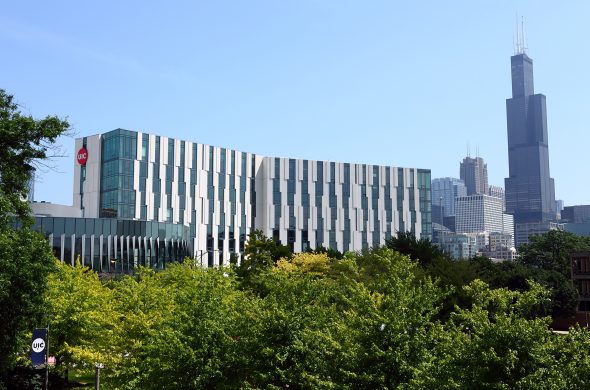
Photo: Jenny Fontaine 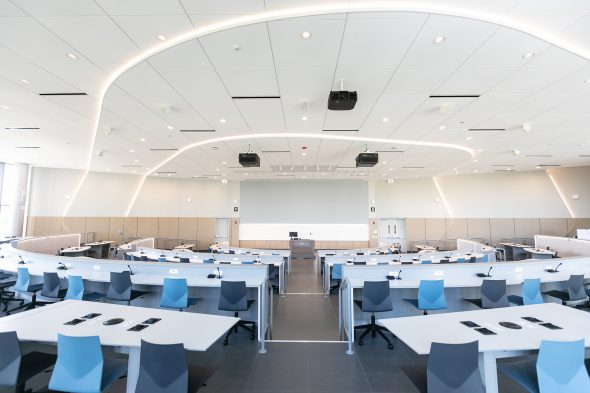
Photo: UIC Creative and Digital Services 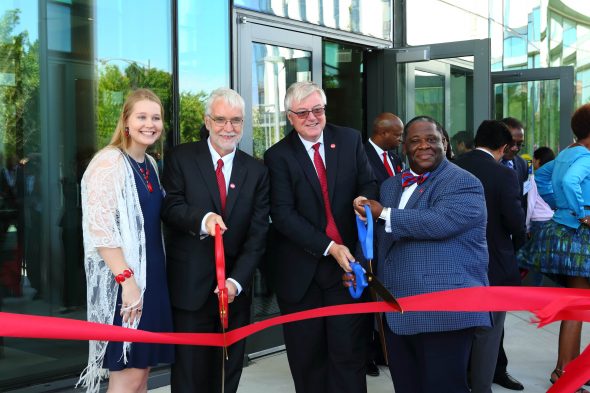
Photo: Jenny Fontaine
Addressing UIC’s record enrollment gains campuswide is the Academic and Residential Complex, which will welcome its first group of student residents this fall at 940 W. Harrison St. For the past five years, UIC has seen record enrollment each fall, and projections show that the number of new students will climb by as many as 10,000 over the next decade.
“This new complex serves as a beacon that illuminates UIC’s growth and burgeoning role as Chicago’s leader in higher education, workforce development and intellectual thought,” Amiridis said.
The innovative living-learning community combines a 10-story residence hall — which houses nearly 550 students — with a two-story academic building. It’s the only campus residence hall where classes also are offered.
The building houses seven interactive classrooms — the largest will seat nearly 300 students — as well as small study rooms, a tutoring center, computer spaces and collaboration spaces where students can work on projects together. The residence hall also features study and social lounges on each floor, a fitness center, laundry facility and a 10th-floor sky lounge. A Starbucks on the first level will be run and managed by students.
The $100 million facility was part of a public-private partnership with American Campus Communities, an Austin, Texas-based company and the nation’s largest developer of high-quality student housing communities.
“By thinking creatively and utilizing a public-private partnership, we are able to provide a much-needed complex for our students with state-of-the-art amenities to enhance their learning experience in the heart of a world-class city,” Amiridis said.
The Academic and Residential Complex is key to addressing UIC’s exponential enrollment growth, said Vice Chancellor for Student Affairs J. Rex Tolliver.
“Today, we say to students and families that if you choose UIC for your educational journey, you will find state-of-the-art classrooms and living/learning environments that have been intentionally planned to foster student success,” Tolliver said at a ribbon-cutting ceremony July 18. “We are committed to ensuring that the fastest-growing university in the state will have the needed facilities to meet the demand and expectations today, tomorrow and well into the future.”
UIC John Marshall Law School
Earlier this month, the UIC John Marshall Law School — Chicago’s first and only public law school — received approval from the Higher Learning Commission, the last step in the accreditation process. The law school officially is set to become UIC’s 16th college Aug. 16.
The UIC John Marshall Law School, which welcomes its first class of students this fall, will continue to operate at its current downtown Loop location at the corners of State Street, Jackson Boulevard and South Plymouth Court — expanding UIC’s footprint into the city.
By acquiring the law school, UIC “will fill a 50-year gap in its academic offerings as a comprehensive research university,” Amiridis said.
“Through our research and scholarship, we have celebrated and contributed to the rule of law for decades and now we open the doors of our academic community to those who teach the law and those who study the law.”
John Marshall has a history of providing access to students from underserved communities, reflecting UIC’s mission. The acquisition will provide current and prospective law students with more affordable education, as well as enhanced student services, such as access to health care, recreational facilities, residence halls and college athletics. It also will create opportunities for interdisciplinary courses and new joint and dual-degree programs aligned with UIC strengths in the health sciences, engineering and technology, urban planning and public administration, the social sciences and business.
“Chicago is the largest city in the U.S. without a public law school,” said Darby Dickerson, dean of the law school. “The UIC John Marshall Law School will fill that gap while also enhancing legal services available to the people of Chicago.”
The new UIC law degree can be completed full time or part time and during the day or evenings. Students with undergraduate degrees in any discipline may apply.
For more information, visit jmls.uic.edu
